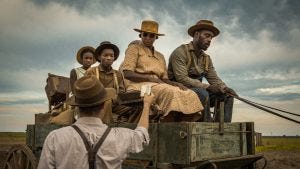Mudbound

Mudbound is the rare kind of race-driven period film that does its best to remain authentic to the barbaric attitudes, beliefs, and social norms about race that permeated—and to some degree, still permeate—white society. So often, these movies sugarcoat the regrettable truth of our past, admitting the prevalence of racism but always with a self-congratulatory pat on the backs of the white characters. But Netflix’s most recent feature film, set in Mississippi in the 1940s, opts not to give much redemption to its white characters, giving viewers in 2017 an unblinking reminder of our cruel history, as well as some parallels to how that cruelty is not all behind us. For that resolute commitment to tragic authenticity, Mudbound deserves praise.
At the start, Mudbound is about Henry and Laura McAllan (Jason Clarke and Carey Mulligan, respectively), a southern white couple who move out to a farm so that Henry can pursue a dream. Joining them is Henry’s aging father Pappy (Jonathan Banks). Laura is not the biggest fan of the idea, but reluctantly goes along with it for the sake of her husband. (That dynamic is their marriage in a nutshell.) Down the road is the Jackson family: Hap (Rob Morgan) and Florence (Mary J. Blige) and their children. The McAllan’s don't socialize much with the Jackson's, except to hire them for farm work. Meanwhile, the Jackson’s son Ronsel (Jason Mitchell), as well as Henry's brother Jamie (Garrett Hedlund, in one of his best roles) are fighting in World War II. When they each return, home doesn't feel so cozy anymore. As Ronsel and Jamie bond over their war histories, tensions rise between the McAllan’s and the Jackson's, mostly fueled by Pappy’s vitriolic loathing for black people and disgust in his son's new-found friendship. It's one part family drama, one part race drama, all parts dirty and sticky as the characters try to live off the land on a farm swamped with rain.
Unfortunately, the film's biggest mistake is being boring and distracted, mostly in its first half. Clocking in at two hours and 14 minutes, the dry narrative can only maintain the intensity of its best scenes in isolated bursts, mostly occurring toward the end. When it's at its best, Mudbound is gripping, brutal, and effectively frustrating. But there's a lack of urgency in getting to the parts of the story that serve the movie's purpose, and those parts aren't quite engaging or valuable enough on their own to justify the runtime, a flaw which drastically cuts down the engagement factor overall.
Specifically, it's the choice of focusing so much on the McAllan’s family and marriage issues. It doesn't feel odd as it is playing out, but by the end of the film, one might be asking, “Why did we spend so much time on them?” The third act is by far the most focused of the film, and its tragic, passionately executed subject calls into question the relevance of all the struggles that Laura and Henry faced early on in the film. It's all very well-made, to be sure. Much of it just feels like extra baggage on an already heavy story.
What the film does best is its characters. Each is clearly defined in their motives and values, without seeming to cartoonishly distinctive or obvious. Every single member of the cast brings their A-game, especially Hedlund and Morgan. Despite a few star faces, none feels like it stands out above its character; the actors and script work well in tandem to breathe life into the figures of the story.
As mentioned earlier, Mudbound does not water down the subliminal, infectious racism in its white characters. I often find it amusing in race movies when there is one obviously racist figure who reads more like a parody of a bigot than an actual display of what used to be a very common mentality. And while Mudbound does have a distinguishable beacon of hate in Pappy, other characters, like Henry, show their learned prejudice in other ways; rather than spewing racial slurs, he simply enables or enforces racist norms and social practices. In this way, the characters of Mudbound avoid feeling too clean-cut and redemptive. After all, the story is not about how the white man realized the error of his ways and picked up the black man he pushed down. It's about the black man's suffering at the hands of the white man, and more importantly, the connecting of human beings in spite of others’ hatred.
